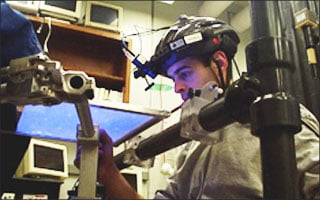Error memories enable improved performance and faster learning

Researchers have long known that people learn a motor task faster the second or third time around, but they did not know why. A new study lead by Reza Shadmehr, PhD of the Department of Biomedical Engineering shows that not only are memories made of the task itself, but also of errors made while learning to do the task. This previously unknown form of memory — a memory of errors —demonstrates that when we are better at a motor task, it is partly because the brain recognizes the errors it experienced before.
Experiments led researchers to understand why people learn an identical or similar task faster on subsequent trials. In the experiment, Shadmehr’s team put volunteers in front of a joystick that was concealed by a screen. Volunteers moved the joystick, represented by a blue dot on the screen, as directed to a target red dot.
As volunteers moved the joystick toward it, the blue dot could be programmed to move slightly off-kilter from where they pointed it, creating an error. Participants then adjusted their movement to compensate for the off-kilter movement and, after a few more trials, smoothly guided the joystick to its target.
“In learning a new motor task, there appear to be two processes happening at once,” says Dr. Shadmehr. “One is the learning of the motor commands in the task, and the other is critiquing the learning, much the way a ‘coach’ behaves. Learning the next similar task goes faster, because the coach knows which errors are most worthy of attention. In effect, this second process leaves a memory of the errors that were experienced during the training, so the re-experience of those errors makes the learning go faster.”
The study, entitled “A memory of errors in sensorimotor learning,” are published in Science. Other authors on the paper were David Herzfeld, Pavan Vaswani, and Mollie Marko of the Johns Hopkins University School of Medicine. The work was supported by the National Institute of Biomedical Imaging and the National Institute of General Medical Sciences, and the National Institute of Neurological Disorders and Stroke.
The next step in the research, Shadmehr says, will be to find out which part of the brain is responsible for the “coaching” job of assigning weight to different types of error. It is expected that the results may improve movement rehabilitation strategies for stroke and neuromotor injury victims.
